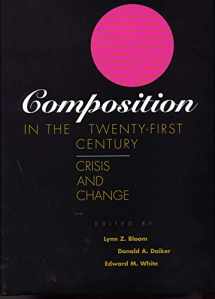
Composition in the Twenty-First Century: Crisis and Change
ISBN-13:
9780809318780
ISBN-10:
0809318784
Edition:
First Edition
Author:
Lynn Z. Bloom, Edward M. White, Dr. Donald A. Daiker B.A. Ph.D.
Publication date:
1996
Publisher:
Southern Illinois University Press
Format:
Hardcover
320 pages
FREE US shipping
on ALL non-marketplace orders
Marketplace
from $9.95
USD
Marketplace offers
Seller
Condition
Note
Seller
Condition
Used - Very Good
Very Good; Very good hardcover in very good dust jacket. First Printing with full number line. Binding is tight, sturdy, and square; boards and text also very good. Light shelfwear to boards, dust jacket. NOT ex-library. Ships from Dinkytown in Minneapolis, Minnesota.
Book details
ISBN-13:
9780809318780
ISBN-10:
0809318784
Edition:
First Edition
Author:
Lynn Z. Bloom, Edward M. White, Dr. Donald A. Daiker B.A. Ph.D.
Publication date:
1996
Publisher:
Southern Illinois University Press
Format:
Hardcover
320 pages
Summary
Composition in the Twenty-First Century: Crisis and Change (ISBN-13: 9780809318780 and ISBN-10: 0809318784), written by authors
Lynn Z. Bloom, Edward M. White, Dr. Donald A. Daiker B.A. Ph.D., was published by Southern Illinois University Press in 1996.
With an overall rating of 4.0 stars, it's a notable title among other
books. You can easily purchase or rent Composition in the Twenty-First Century: Crisis and Change (Hardcover) from BooksRun,
along with many other new and used
books
and textbooks.
And, if you're looking to sell your copy, our current buyback offer is $0.39.
Description
The essays in this book, stemming from a national conference of the same name, focus on the single subject required of nearly all college students—composition.Despite its pervasiveness and its significance, composition has an unstable status within the curriculum. Writing programs and writing faculty are besieged by academic, political, and financial concerns that have not been well understood or addressed.At many institutions, composition functions paradoxically as both the gateway to academic success and as the gatekeeper, reducing access to academic work and opportunity for those with limited facility in English. Although writing programs are expected to provide services that range from instruction in correct grammar to assisting—or resisting—political correctness, expanding programs and shrinking faculty get caught in the crossfire. The bottom line becomes the firing line as forces outside the classroom determine funding and seek to define what composition should do.In search of that definition, the contributors ask and answer a series of specific and salient questions: What implications—intellectual, political, and institutional—will forces outside the classroom have on the quality and delivery of composition in the twenty-first century? How will faculty and administrators identify and address these issues? What policies and practices ought we propose for the century to come?This book features sixteen position papers by distinguished scholars and researchers in composition and rhetoric; most of the papers are followed by invited responses by other notable compositionists. In all, twenty-five contributors approach composition from a wide variety of contemporary perspectives: rhetorical, historical, social, cultural, political, intellectual, economic, structural, administrative, and developmental. They propose solutions applicable to pedagogy, research, graduate training of composition teachers, academic administration, and public and social policy. In a very real sense, then, this is the only book to offer a map to the future of composition.


We would LOVE it if you could help us and other readers by reviewing the book
Book review

Congratulations! We have received your book review.
{user}
{createdAt}
by {truncated_author}


